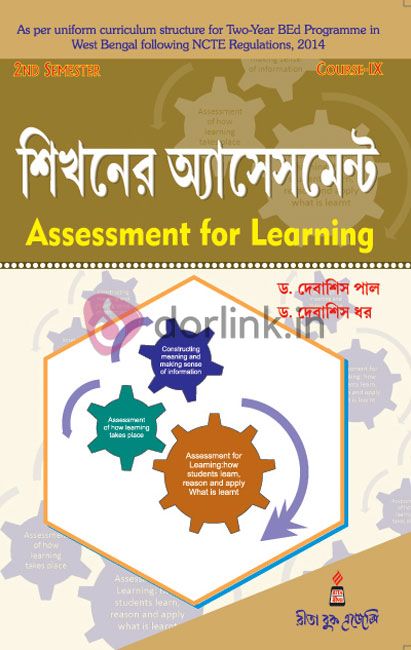Writer : Dr. Debashis Paul & Debashis Dhar
- Shipping Time : 4 Days
- Policy : Return/Cancellation?
You can return physically damaged products or wrong items delivered within 24 hours with photo/video proof.
Contact Customer Support for return initiation and receive return authorization via email. Securely package for return.
Refunds for eligible returns are processed within 7-10 business days via Bank Transfer.
Order cancellation allowed within 24 hours of placing it. Standard policy not applicable for undamaged/wrong product cases. Detailed info. - Genre : Educational>D.El.Ed/B.Ed./M.Ed.
- Publication Year : NA
- ISBN No : NA
- Binding : No Binding Available
- Pages : NA
- Weight : NA
- Height x Width x Depth : xx Inch
If so, it will be notified
About the Book
:
1st Half: Assessment of the Learning Process
Unit I : Concept of Evaluation and Assessment:
- Meaning of Test, Measurement, Assessment and Evaluation
- Distinguish among Measurement, Assessment and Evaluation
- Nature and purpose of Evaluation
Unit II: Approaches and Techniques of Evaluation and Criteria of Assessment Procedure:
- Approaches–Formative and Summative; NRT and CRT
- Techniques–observational, self-reporting, psychological and Educational tests
- Validity–Meaning, Types and Measurement
- Reliability–Meaning, Types and Measurement
- Norm and Usability
Unit III: Psychological Test:
- Meaning and concept
- Preliminary idea about–Intelligence test, Aptitude test, Interest Inventory, Attitude test, Creativity and Personality
- Achievement test–Meaning, characteristics, steps for construction and uses
- Diagnostic and prognostic test
Unit IV: Evaluation:
- Types of Tests; Written Test, Oral Test, NRT, CRT, Summative Test, Formative Test, Diagnostic Test.
- Scoring and Grading, Analysis of Score and Its Interpretation
(a) Tabulation of data.
(b) Graphical (Histogram, frequency Polygon)
(c) Central Tendency (Mean, Median Mode)
(d) Deviation–Standard.
Unit V: Problem–Learner:
- Problem–Learner; Concept and Types,
- Identification of Problem–Learner; Observation, Case Study, Socio- Metric & Testing (Educational and Psychological) Techniques.
- Remedial Measures—Guidance & Counseling, Life-Skill Training.
2nd Half: Assessment of the Learning System
Unit I: Infrastructural facilities:
- Rooms (types and numbers),
- Classroom furniture,
- Sanitation facility,
- Drinking water,
- Playground
- Library
Unit II: Human Resource:
- Teaching staff (Full Time + Part Time + Para teacher)
- Non -Teaching staff
- Students:- Boys / Girls / SC / ST /OBC / Minority / Special Needs Children.
- Teacher-student Ratio.
Unit III: Management & Record Maintenance:
- Managing Committee
- Committees for Academic Purposes
- Different Committees
- Fee Structure,
- Number of units/School hour/time table/periods
- Students participation—student Self-Government.
- Records: ❖ Accounts related ❖ Staff related ❖ Student related ❖ Curriculum
related
Unit IV: Special Service Provided:
- Mid-Day Meal
- Book bank for poor students
- Tutorial for weaker students
- Remedial teaching
- Parent Teacher Association
- Staff Welfare Service
- Health Programme
- Conducting Talent Search Examination
- Providing Scholarship
Unit V: School Community relationship:
- Community involvement in decision making.
- Community Contribution to school
- Meeting with community members
- School response to parents

